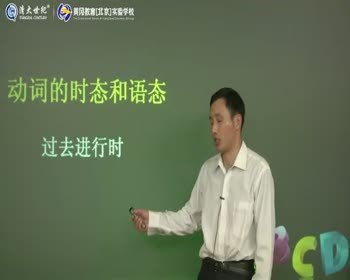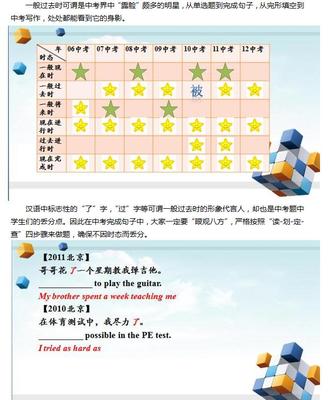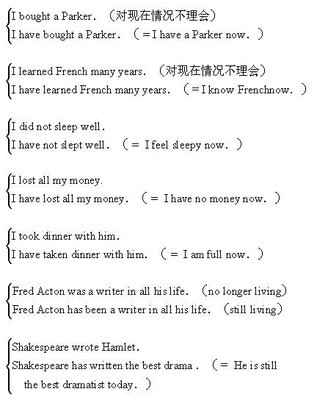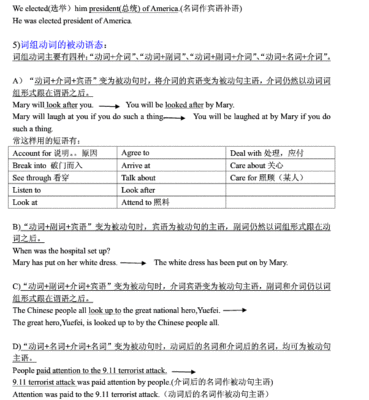一般过去时表示过去某一时候或某一段时间所发生了的事情或存在的状态。常与过去时间yesterday, this morning, just now, a moment ago, in May, last night / year / week, once upon a time, the other day, in the past 等连用。如:
What did you do yesterday? 昨天你干了什么?
I met Lin Tao this morning. 今天上午我会到了林涛。
I was there a moment ago. 刚才我在那儿。
二、一般过去时的应用
1. 一般过去时表示过去
(① 表示在过去某个时间发生的动作或情况。
例如:I went to school at 7:00 yesterday morning.我昨天早晨七点去上学。
② 表示在过去某个时间存在的状态。
例如:She was not at home last night.她昨晚八点没在家。
③ 表示在过去经常或反复发生的动作,常和often(经常)、always(总是)、sometimes
(有时)等表示频率的时间状语连用。
例如:He often had lunch at school last month.他上个月经常在学校吃午饭。
④ 表示已故的人所做的事情或情况。
例如:Ba Jin wrote a lot of novels for us.巴金写了很多部小说。
2. 一般过去时表示现在
(1) 在宾语从句中,由于时态呼应的关系,可用一般过去时表示现在:
I didn’t know you were here. 我不知道你在这儿。(were实际上指现在)
I didn’t know you were so busy.我没想到你这么忙。(were实际上指现在)
(2) 表示客气委婉的现在
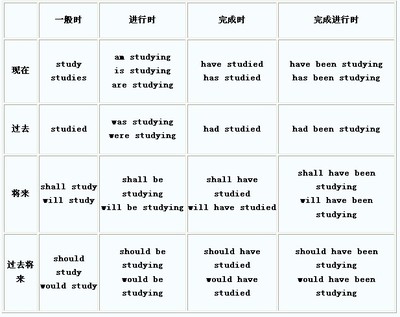
I wondered if you were free this evening. 不知您今晚是否有空。
I thought you might like some flowers. 我想您也许想要些花。
注:能这样有的动词主要限于want, wonder, think, hope, intend等少数动词。
(3) 用于某些特殊结构中表示现在
It’s time we started. 我们该动身了。
I wish I knew his him. 要是我知道他的名字就好了。
I’d rather you lived closer to us. 我希望你能住得离我们近点。
注:该用法主要用于it’s time, I wish, I’d rather, if only, as if, as though 等少数结构后接从句的情形,其中有些结构后面的句子还可用一般过去时表示将来:
I’d rather you come next Monday. 我宁愿你下周星期一来。
另外表主观想法的虚拟条件句也用一般过去时表示现在:
If I had the money now I’d buy a car. 假若我现在有钱,我就买辆小汽车。
三、一般过去时对谓语动词的要求
一般过去时的谓语动词要用动词的过去式。动词过去式的构成分规则变化和不规则变化两种形式,不规则变化通常需要逐个记忆,规则变化则遵循以下原则:
(1) 一般在动词后加-ed。如:play—played, offer—offered, weigh—weighed, destroy— destroyed, sign—signed.
(2) 在以字母e结尾的动词后,只加-d。如:like—liked, provide—provided, hate — hated, date—dated。
(3) 在以“辅音字母+y”结尾的动词后,则改y为i,再加—ed。如:supply—supplied, fly—flied, study— studied.
(4) 在以单短元音的重读闭音节结尾且,末尾只有一个辅音字母的动词后,双写最后一个辅音字母,再加-ed。如:plan—planned, refer—referred, regret—regretted, ban—banned.
四、特别说明
有些动词的过去时,如:expect, hope, intend, plan, wanted 等一般过去时,后接不定式的完成时;或它们的过去完成时接不定式的一般式,都可表示过去未曾实现的意图、打算或希望。如:
I hoped to have been invited to his wedding party. —I had hoped to be invited to his wedding ceremony. 我本希望他来邀请我参加他的婚礼。
I intended to have joined their games. —I had intended to join their games. 我本打算参加他们的比赛。
五.一般过去时句式变换
① 一般过去时态的肯定句式 “主语+动词过去式+其它”
例如:Jenny bought a skirt yesterday. 詹妮昨天买了一件短裙。
② 一般过去时态的否定句式 “主语+didn’t+动词原形+其它”
例如:Jenny didn’t buy a skirt yesterday. 詹妮昨天没有买短裙。
③ 一般过去时态的一般疑问句式 “Did+主语+动词原形+其它”
例如:Did Jenny buy a skirt yesterday? 詹妮昨天买短裙了吗?
④ 一般过去时态的特殊疑问句式 “疑问词+did +主语+动词原形+其它”
例如:What did Jenny buy yesterday? 詹妮昨天买了什么?
英语时态讲解:过去进行时
一、过去进行时的理解
过去进行时主要表示过去某一时刻正在进行的动作,或表示过去某一阶段一直在进行的动作。如:
I was having a talk with Li Hua at that time. 那时,我正在跟李华谈话。
I was watching TV at home last night. 昨晚我一直在看电视。
基本结构:was / were +doing
否定形式:was / were + not + doing.
一般疑问句:把was或were放于句首。
过去进行时就是表示在过去某时正在进行的动作或发生的情况。如汉语说“我进来时他正在吃饭”,如果“进来”发生在过去,那么“正在吃饭”显然就是过去某时正在进行的动作——也就是说,“进来”用一般过去时,“正在吃饭”就要用过去进行时。
二.动词be的过去进行时
动词 be 的过去进行时也表示过去一时的表现或暂时的状态。比较:
He was friendly. 他很友好。(指过去长期如此)
He was being friendly. 他当时显得很友好。(指当时一时的表现)
三、过去进行的构成
过去进行时由“was / were + 现在分词”构成。如:
Someone is knocking the door. 有人在敲门。
Steam was rising from the coffee. 咖啡冒着热气。
Clouds were flying across the sky. 云彩飘过天空。
注意有些was (were) doing sth不是现在进行时,而是系表结构,其中的doing sth是动名词,不是现在分词。如:
Her job was washing clothes. 她的工作是洗衣裳。
Her hobby was growing roses. 她的爱好是种植玫瑰。
Her suggestion was having our conversation in French. 她的建议是我们用法语交谈。
四、过去进行时的主要用法
1. 表示在过去某一点时间或某一段时正在进行的动作。如:
I was having a bath when the phone rang. 我正在洗澡,突然电话铃响了。
She was writing letters. I didn’t want to disturb her. 她在写信。我不想打扰她。
2. 表示在过去短期内正在进行的动作或存在的情况,这种情况通常不会长期如此。如:
It happened while I was living in Eastboume last year. 这件事发生于去年我住在伊斯特本的时候。
3. 表示为过去的将来安排好的活动和事件。这类用法在没有明确上下文的情况下,通常会连用一个表示将来时间的状语。如:
He said that his sister was getting married next December. 他说他妹妹12月结婚。
用arrive, come, go, leave等动词的现在进行时描写行程安排,也通常有含有将来意义。如:
Four of them were coming for Sunday lunch. 他们有四个人将在星期天来吃午饭。
Her daughter was going to a summer camp the following day. 她的女儿将在第二天去参加夏令营。
4. 动词 hope, wonder 等的过去进行时常用来表示提出要求,虽然表示现在的内容,但语气比一般现在时或一般过去时要委婉。如:
I was wondering if you could give me a lift. 我不知您能不能让我搭一下车。
I was thinking it might be a good idea to keep the window open. 我看还是把窗户开着的好。
注:一般过去时也有类似用法,相比之处,一般过去时通常表示主语的行为是经过认真考虑的,而过去进行时则多表示一种较随便或没有进行仔细考虑的行为。
5. 过去进行时有时可以与always, constantly, continually, forever, perpetually, repeatedly等表示动作屡次发生的副词连用,强调动作的不断重复的。如:
She was always thinking of others. 她老是想到别人。
He was constantly changing his mind. 他老是改变主意。
She was forever complaining. 她老是抱怨。
注:现在进行时也有类似用法,但过去进行时是表示过去不断重复的动作,而现在进行时是表示现在不断重复的动作。
英语时态讲解:过去完成时
一、 什么叫过去完成时?它是怎样构成的?
过去完成时表示一个动作或状态在过去某一时间或动作之前已经完成或结束,也可能是早已完成或结束,即“过去的过去”;也可以指过去的动作延续到过去的某个时刻。
过去完成时由“had +动词的过去分词”构成, had通常用于任何人称。
二、 过去完成时有哪些用法?
(1)表示在过去某一时刻或动作以前完成了的动作,也可以说过去发生的事对现在的影响与结果(根据语境分析)。可以用by, before等介词短语或一个时间状语从句(在复合句中,由时间连接词引导的状语从句叫做时间状语从句)来表示,也可以用一个表示过去的动作来表示,还可能通过上下文来表示。
e.g:By nine o’clock last night, we had got 200 pictures from the spaceship.
到昨天晚上9点钟,我们已经收到200 张飞船发来的图片。
(2)表示由过去的某一时刻开始,一直延续到过去另一时间的动作或状态,常和for, since构成的时间状语连用。
e.g:I had been at the bus stop for 20 minutes when a bus finally came.
我在车站已经等了20分钟,一辆公共汽车终于来了。
He said he had worked in that factory since 1949.
他说他自从1949年以来他就在那家工厂工作。
(3)叙述过去发生的事情,在已叙述了过去发生的事情后,反过来追述或补述以前发生的动作时,常使用过去完成时。
e.g:Mr. Smith died yesterday. He had been a good friend of mine.
史密斯先生昨天就去世了。他以前是我的好朋友。
I didn’t know a thing about the verbs, for I had not studied my lesson.
我对动词一无所知,因为我没有好好学习功课。
(4)在含有定语从句的主从复合句中,如果叙述的是过去的事,先发生的动作常用过去完成时。
e.g:I returned the book that I had borrowed.
我已归还了我借的书。
She found the key that she had lost.
她发现她失去了的钥匙。
(5)过去完成时常常用在told,said,knew,heard,thought等动词后的宾语从句(或间接引语)中,这时从句中的动作发生在主句表示的过去的动作之前。
e.g:He said that he had known her well.
他说他早就知道她的好。
I thought I had sent the letter a week before.
我认为我一星期前就把信寄出去了。
(6)状语从句:在过去不同时间发生的两个动作中,“发生在过去的过去”,用过去完成时;发生在后,用一般过去时。
如when,before,after,as soon as,till/until引导的
e.g:When I woke up, it had already stopped raining.
我醒来时雨已停了。
She didn’t go to bed until she had finished her work.
她直到把工作做完之后才睡觉。
注意:如果两个动作紧接着发生,则常常不用过去完成时,特别是在包含before和after的复合句中,因为 这 时从句的动作和主句的动作发生的先后顺序已经非常明确,这时可以用一般过去时代替过去完成时。
e.g:After he arrived in England, Marx worked hard to improve his English.
马克思到达英格兰之后,努力提高他的英语水平。
(7)动词think, want, hope, mean, plan, intend等用过去完成时来表示过去未曾实现的想法,希望,打算或意图等。
e.g:They had wanted to help but could not get there in time.
他们本来打算去帮忙,但没有及时赶到那里。
We had hoped to be able to come and see you .
我们本来希望能来看看你。
(8)过去完成时还可用在hardlywhennosoonerthanIt was the first (second, etc)
time (that)…等固定句型中。
e.g:Hardly had he begun to speak when the audience interrupted him.
他刚开始演讲,听众就打断了他。
No sooner had he arrived than he went away again.
他刚到就又走了。
It was the third time that he had been out of work that year.
这是他那一年第三次失业了。
三,过去完成时标志的时间状语
before,when,after,by+,until, once,had no sooner……than,yet,already等。
例句
By the time he was twelve,Edison had begun to make a living by himself. 到了十二岁那年,爱迪生开始自己谋生。
By nine o’clock last night, we had gotten 200 pictures from the spaceship到昨晚九点钟时,,我们已经收到了来自宇宙飞船的200张照片。
I had been at the bus stop for 20 minutes when a bus finally came当公共汽车终于到了时,我在车站已经等了20分钟。
He said he had worked in that factory since 1949.他说他已经自1949年以来在那个工厂工作。
Mr. Smith died yesterday. He had been a good friend of mine史密斯先生昨天去世了。他是我的好朋友
I didn’t know a thing about the verbs, for I had not studied my lesson.我对动词一无所知,因为我没有好好学习功课。
I returned the book that I had borrowed.我已归还了我借的书。
She found the key that she had lost.她发现她失去了的钥匙。
It was the third time that he had been out of work that year这是他那一年第三次被失业。
I had finished reading the novel by nine o'clock last night到昨晚9点钟,我已经读完这本小说。
英语时态讲解:过去完成进行时
一、过去完成进行时结构形式
过去完成进行时由“had been+现在分词”构成,因此无人称变化。
She had been suffering from a bad cold when she took the exam.
她在考试之前一直患重感冒。
Had they been expecting the news for some time?
他们期待这个消息有一段时间了吧?
Rafael was scolded even though he hadn't been doing anything wrong.
尽管拉斐尔没做什么错事,但他还是挨骂了。
二.过去完成进行时的用法
①表示过去某一时间之前一直进行的动作。
过去完成进行时表示动作在过去某一时间之前开始,一直延续到这一过去时间。和过去完成时一样,过去完成进行时也必须以一过去时间为前提。
I had been looking for it for days before I found it.
这东西我找了好多天才找着的。
They had only been waiting for the bus a few moments when it came.
他们只等了一会儿车就来了。
②表示反复的动作。
He had been mentioning your name to me.
他过去多次向我提到过你的名字。
You had been giving me everything.
你对我真是有求必应。
③过去完成进行时还常用于间接引语中
The doctor asked what he had been eating.
医生问他吃了什么。
④过去完成进行时之后也可接具有“突然”之意的when分句。
I had only been reading a few minutes when he came in.
我刚看了几分钟他就进来了。
She'd only been reviewing her lessons for a short while when her little sister interrupted her.
她温习功课才一会儿,她妹妹就打断她了。
这个时态也可用在某些从句中,这时从句的动作发生在主句的动作之前而对其有影响:
I heard you’d been looking for me. 我听说你一直在找我。
That was just the letter I had been expecting. 这正是我一直期待的信。
That was exactly what we had been trying to do. 这正是我们一直想做的事。
I wanted to know what had been going on. 我想知道一直在发生什么事。
The drive increased the fatigue she had been feeling. 开车增加了她一直感到疲惫感觉。
They said that they had been fighting for their rights all these years. 他们说这些年来他们一直在为他们的权利而斗争。
过去完成进行时和过去完成时的比较
She had cleaned the office, so it was very tidy.
她已经打扫过办公室了,所以很整洁。 (强调结果)
She had been cleaning the office, so we had to wait outside.
她一直在打扫办公室,所以我们不得不在外面等着。 (强调动作一直在进行)
 爱华网
爱华网